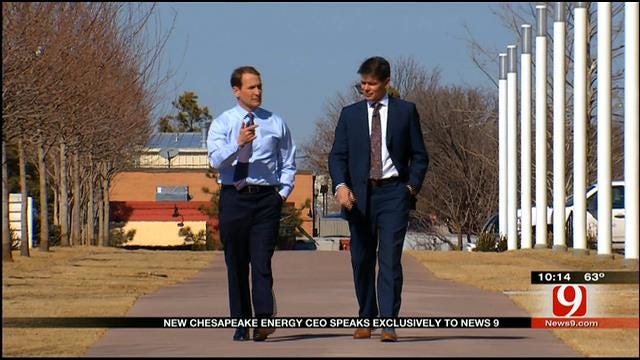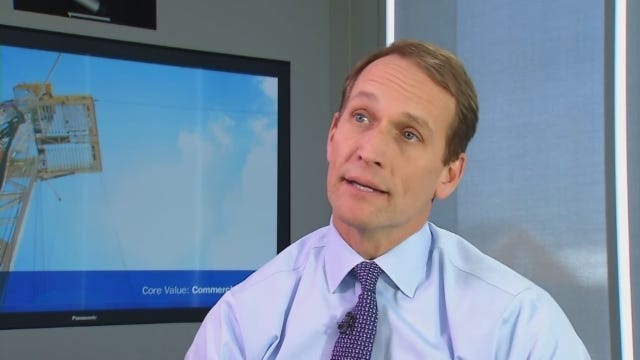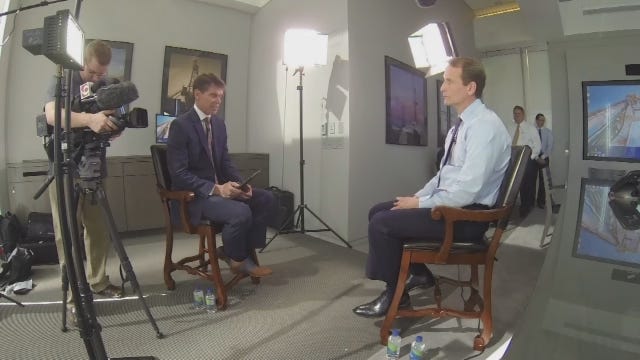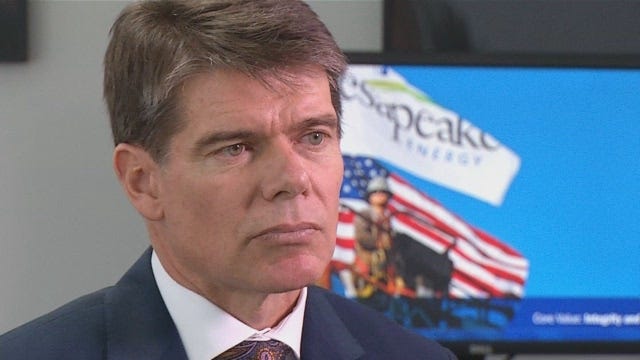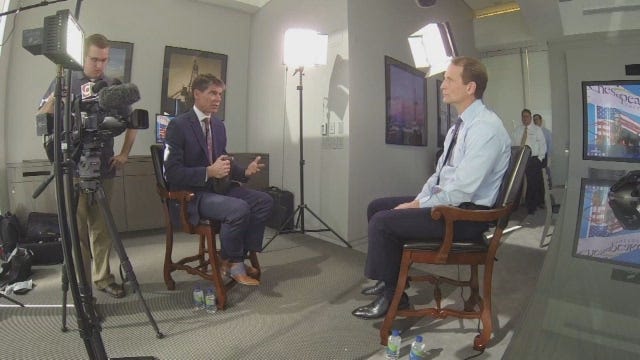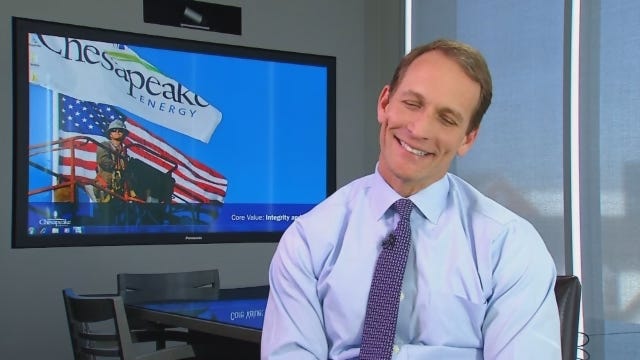New Chesapeake CEO Discusses Challenges, Vision For Future
"A little bit uncomfortable," that's how the CEO of Chesapeake Energy says it felt taking the reins of the oil and gas company from Aubrey McClendon last spring.Wednesday, February 19th 2014, 10:50 pm
"A little bit uncomfortable," that's how the CEO of Chesapeake Energy says it felt taking the reins of the oil and gas company from Aubrey McClendon last spring.
Not only was Doug Lawler assuming control of a company that was struggling with both performance and governance issues, he was stepping into the shoes of a man he calls a "visionary entrepreneur."
"It was an interesting change for me," said Lawler, cracking a grin that seemed to signal this was an understatement.
Since coming to Chesapeake, Lawler has been busy -- initiating a transformation that included laying off nearly 10 percent of Chesapeake's workforce, but which, Lawler says, should position the company for long-term success.
In his first broadcast interview since arriving in Oklahoma City, Lawler addressed a variety of topics, but none more difficult than his decision last fall to cut 1,000 jobs.
"It's a very painful thing," Lawler said. "It's very hard to say goodbye to fellow employees and individuals that have worked hard to build the company."
Founded in 1989 by McClendon and Tom Ward, Chesapeake grew into the second largest producer of natural gas, with the number of employees peaking a couple of years ago at over 13,000.
Lawler says there was an atmosphere of uncertainty among many of them when he started, and his priority was to clear that up as quickly and responsibly as he could. He conducted a thorough review of the company's assets and operations, and made the decision that positions needed to be cut.
"It's not something that anyone enjoys, any leader wants to be a part of, or that we would have ever set out to do," Lawler explained. "The simple matter of fact, though, is the strategy the company needed going forward required us to reorganize."
In truth, the reorganization started well before Lawler arrived. In 2012, a powerful bloc of shareholders led by investor Carl Icahn, citing concern with what they saw as underperforming stock and reckless spending by then-CEO McClendon, agitated for control of the company's board of directors. In early 2013, word came the McClendon had agreed to resign.
Lawler credits McClendon for building a great company with talented employees. He says, considering what the company had been through, he didn't anticipate the level of energy he found among workers.
"And it was very positive energy," Lawler said. "It was also energy directed to change, and willing to change."
That was important, the 47-year-old CEO says, because he believes there has to be a cultural change at Chesapeake. In order to create greater value in the current market, for shareholders and employees, he says, there has to be greater financial discipline.
News 9 asked Lawler if there was a lack of financial discipline in the past.
"Well, I'd point it toward the future," Lawler answered, "and say that the growth of the company requires a different level of financial discipline."
Chesapeake's 2014 guidance, released earlier this month, sheds some light on this new level of discipline. The company is projecting capital expenditures between $5.2 and $5.6 billion, a 20 percent reduction. At the same time, Lawler says, production should increase 2-4 percent, or 8-10 percent, when adjusted for asset sales.
"We're not going to be drilling to retain and to hold a lease," Lawler told us, "we're going to be drilling the most economic and the best opportunities to add the most value."
Lawler says he will continue to look for opportunities to sell assets and reducing the company's debt.
"Those [assets] that are not going to materially add to the growth story of the company -- what we categorize as non-core assets," Lawler said, "we'll be reducing those and the proceeds will go toward improving the balance sheet."
Lawler is intent on driving down per-unit production costs, as well as, general and administrative expenses through a variety of cost control initiatives. He says employees are doing their part.
"The teams have just done an outstanding job," Lawler stated. "The last several months of 2013 and what we've forecast and provided guidance for in 2014, are beginning to show what this great company can deliver."
A new highly polished image campaign -- "We Are Chesapeake" -- features employees delivering a message to TV audiences that Lawler felt was needed.
"As you know, change is very hard," Lawler said, "and I felt like it was very important that we signal to the community, in every way possible -- internal, external -- the strength of this company."
Mr. Lawler acknowledges Chesapeake is cutting back on its charitable giving, as part of a more prudent approach to spending, but he says the company will still be a very generous community partner, and a company he would expect to still earn a spot on Fortune's annual Best Places to Work list.
"I certainly hope so," Lawler nodded. "The key is you can't be a great place to work and not be a great business, so we have to be a great business first."
Lawler admits employee morale is not perfect right now. With all the recent change, he says there is still some frustration and concern. but, he says, the 'right-sizing' is complete, and does not anticipate any more layoffs.
"Actually," Lawler exclaimed, "it's just the opposite now -- we're looking for strong talent...that can contribute to this strategy as we go forward and help build the company, in a way that, as I said, is more competitive, more productive, healthy and strong for the future."
More Like This
February 19th, 2014
April 23rd, 2025
Top Headlines
April 26th, 2025
April 26th, 2025
April 26th, 2025


